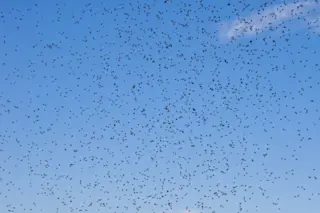(Credit: Pablo Borca/Shutterstock) Look up into the clear blue sky in the spring or fall and you may not see them, but oh boy, are they there. Trillions of them, in fact, riding the high air currents to breeding grounds and back again. Insects ranging from microscopic to splatter-worthy fill the skies around the world each year as they migrate seasonally. A recent study from researchers in the United Kingdom found that in southern England alone, more than three trillion insects passed by each season. That's more than 400 times the global population of humans, and the researchers say that larger migrations likely take place all around the globe.
Researchers deployed a set of experiments at three locations in southern England during seasonal migrations from 2000 to 2009. They used special entomological radar devices to measure the passage of larger insects and relied on nets attached to blimps to sift ...














